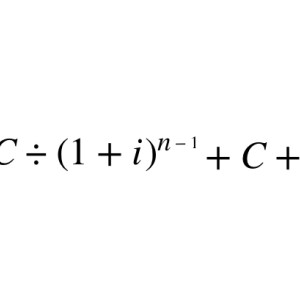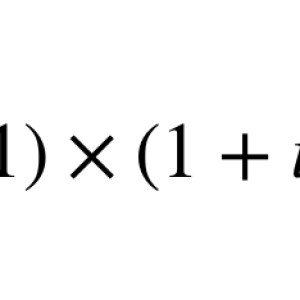Compound Interest with monthly added capital
The thing is: I really don't like not being able to use only one formula to deduct a monthly compound interest with and addition of ×$ every month.
Usually, I would be solving it by using the interest formula and adding x amount for every month, as demonstrated:
10.000$ of Principle 10% of rate (time in months)
In the 1st month i would have 11.000$ with the addition of 1000, that i chose to add every month, so 12.000 to begin the 2nd month with
12.000$ Principle 10% of rate +1.000$ extra one more time 13.200 + 1.000; i would have 14.200$ for the 3rd month.
That's too much job.
Me and a colleague of mine developed 2 different formulas that seem to work, but not every time
The first one works pretty well with the example I first gave: 10.000$, 10% interest /month and +1000$ every month for 3 months.
The second one seems to work with 20.000$, 10% interest/month and +500$ every month for 4 months.
Any ideas?
(Captions: M=Accumulated amount; C=Principle;
i-interest; x=added value
for a 10% monthly interest I used i = 0,1)
Answer
Let $M_n$ be the accumulated amount after $n$ accumulations. Then we have
\[M_n=M_{n-1}i+M_{n-1}+x=M_{n-1}(1+i)+x.\]
Thid means that the accumulated amount after $n$ months is equal to the accumulated amount in the previous month plus the interest earned during the month plus the added value $x$.
Hence
\[M_n=M_{n-1}(1+i)+x=[M_{n-2}(1+i)+x](1+i)+x\]\[=M_{n-2}(1+i)^2+x(1+i)+x.\]
So
\[M_n=M_{n-2}(1+i)^2+x(1+i)+x.\]
Repeating this process we get
\[M_n=M_{0}(1+i)^n+x(1+i)^{n-1}+\dotsx +x(1+i)+x.\]
So
\[M_n=M_{0}(1+i)^n+x[(1+i)^{n-1}+\dotsx(1+i)+1]\]\[=M_0(1+i)^n+x[\frac{(1+i)^{n}-1}{i+1-1}]\]
\[=M_0(1+i)^n+\frac{x}{i}((1+i)^{n}-1).\]
Since $M_0=C$, we get the fomula
\[M_n=C(1+i)^n+\frac{x}{i}\big((1+i)^{n}-1\big).\]
For monthly accumulations with yearly interest rate $I$ we have $i=\frac{I}{12}$. For $I=10\%=\frac{10}{100}$, you should set
\[i=\frac{I}{12}=\frac{\frac{10}{100}}{12}=\frac{1}{120}.\]
-
love this one! one thing tho: using it to solve 10.000$ 10% +1000/month for 3 months gives me 16620$, when it should be 15620$ but using 20.000$ 10% +500/month for 4 months equals to 31.602,5$, which is correct what do you think is causing this?
-
For 10.000$, 10% +1000/month for 3 months I am getting $13277.15. For 10.000$, 10% +1000/month for 4 months I am getting $14387.80. Your numbers seems incorrect. Please double check your work. 15620 for 3 months is incorrect. After three months you have deposited 10,000+3000. 15620-13000=2620 is too much of an interest for only three month!
-
maybe i misunderstood your formula because of the language barrier, for 10.000$, 10% + 1000/month for 3 months this is the way i understood it: Mn= 10.000(1+0,1)^3 +1000/0,1 x ((1+0,1)^4 -1) what am i missing? sorry to bother
-
You probably did not pay attention to the last paragraph. In this case i=1/120 and not 0.1. You will get: M_3=10.000(1+1/120)^3 +1000/(1/120) x ((1+1/120)^3 -1)=14387.80. There is no language barrier here, you just need to read my solution more carefully.
-
- answered
- 3860 views
- $2.00
Related Questions
- Calculating P values from data.
- Solving constant product for price
- A question in probability theory
- Year 12 Finance - Home loans
- X is number of (fair) coin flips needed to land m heads OR m tails. m is arbitrary natural number. Delfine CDF of X. (in It's simplest form)
- Exponential Probability
- Year 12 Finance - Combining Superannuation and withdrawals
- Find Mean, Variance, and Distribution of Recursively Defined Sequence of Random Variables




The offered bounty is low for the level of the question and the amount of time one needs to carefully answer this question.
i am so sorry, it was not my intention! i live in a 3rd world country and i cannot pay more than this :(